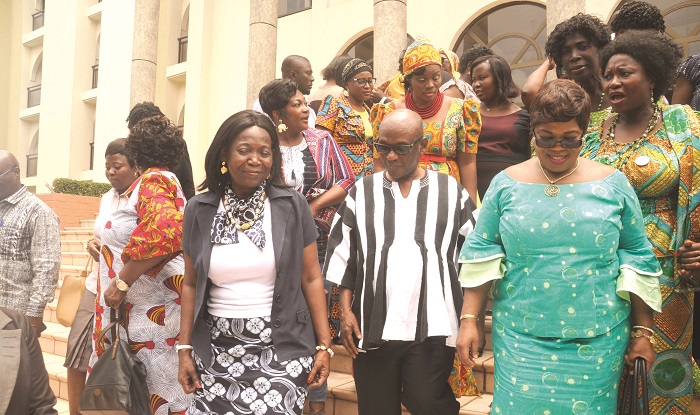
Ghana needs results-oriented strategy to involve critical mass of women in decision-making
Ghana needs to adopt a more results-oriented strategy to ensure that a critical mass of women are involved in the decision-making process.
Advertisement
This will be a positive step towards the attainment of the Sustainable Development Goal (SDG) Five, that focuses on achieving gender equality and the empowerment of all women and girls.
Gender advocates maintain that without measures such as quotas and Affirmative Action (AA), countries in Africa, including Ghana, will not achieve the target of a “critical minority” of at least 30 per cent participation and representation of women in positions of power and decision making at all level.
Consultations
Through several consultations, an AA (Gender Equality) Bill was drafted in 2012 and after many validations across the country and with the proper amendments made, Cabinet approved the bill on June 9, 2016 for the bill to be laid before Parliament.
At a sensitisation programme on the AA (Gender Equality) legislation, for political parties and the media in Accra last Monday, the Deputy Minister for Gender, Children and Social Protection, Mrs Dela Sowah, said the purpose of the bill was to promote the full and active participation of women in public life.
Organised by the Department of Gender of the Ministry of Gender, Children and Social Protection, with support from the United Nations Development Programme (UNDP), the programme brought together representatives of various political parties such as the National Democratic Congress (NDC), the New Patriotic Party (NPP), the Progressive People’s Party (PPP), the People’s National Congress (PNC) and the National Democratic Party (NDP).
The bill, when passed into law, is expected to provide a more equitable system of representation in electoral politics and governance, in accordance with the country’s international and constitutional obligations and national development aspirations.
Mrs Sowah said the bill sought to correct the many years of injustice that had resulted in the imbalance in women’s representation in the political sphere.
Gender imbalance
She stressed that gender imbalance was entrenched in the country’s decision-making system, with many successive governments not being able to rectify it, and pointed out that an AA Law would provide society with diversity, as women’s views would also be expressed.
Ms Hilary Gbedemah, Ghana’s Representative on the Committee on the Elimination of All Forms of Discrimination against Women (CEDAW), who took participants through the contents of the bill, said it was premised on Article 17 of the 1992 Constitution which calls for equal rights of all citizens.
She said the AA Bill when passed, would ensure that there were sanctions for non-compliance with the law on equity in all spheres of life, adding that it was only when legislation was backed by sanctions that the issue of equity would be addressed effectively.
Gender equality law
The acting Director of the Department of Gender, Mrs Comfort Asare, in a welcome address, said globally, gender inequality led to discrimination, social injustice and sub-optimal economic progress due to a serious neglect of a large part of society's human resources.
That, she said, led to deficient democracies which stemmed from various social, cultural and political beliefs and practices which had resulted in various gender disparities and stereotypes, neglecting the concerns and needs and active involvement and participation of women in decision making and other governance activities.
Mrs Joana Opare, an International Gender Consultant, said the mere inclusion of an equal right clause in legislation was insufficient to achieve AA, and, therefore, the need for more proactive steps beyond the laws to ensure that women were given the opportunity to rise.
Representatives of the various political parties pledged their commitment towards a gender equality AA Law for the country.



